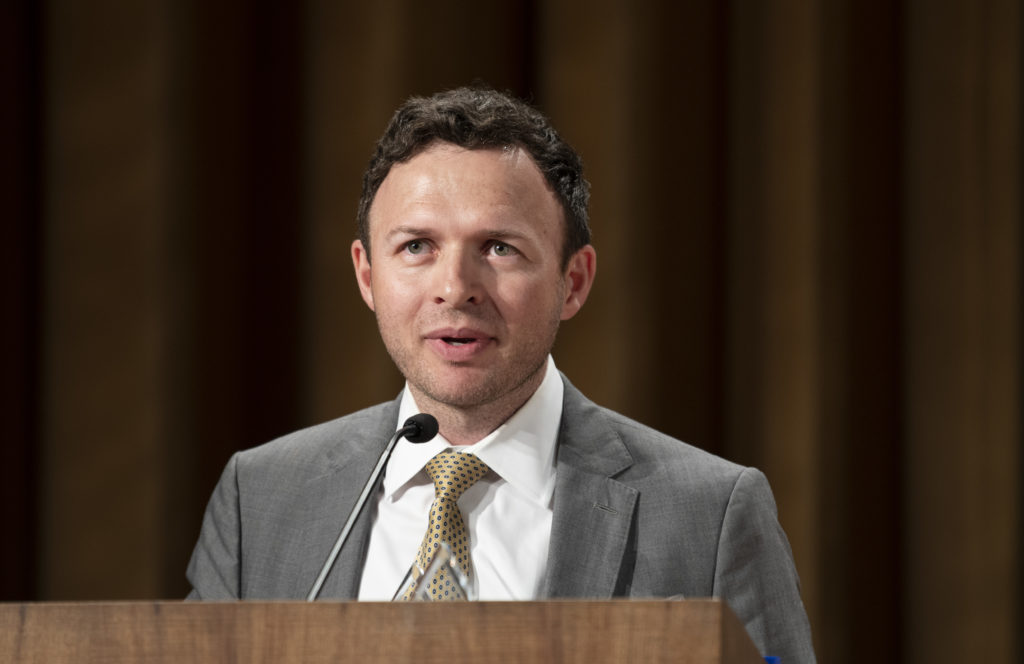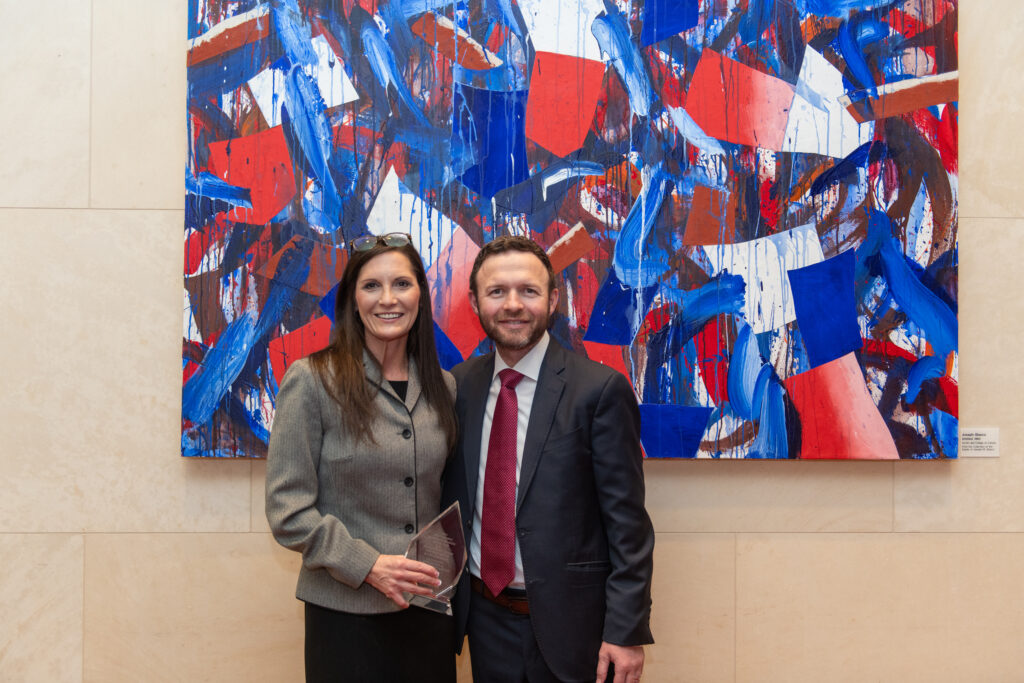
For eight years, Jared Sine has navigated multibillion-dollar M&A deals and bet-the-company litigation at Match Group.
On Friday, Sine announced that he is leaving the dating app tech company on March 11 to become the chief legal and chief strategy officer with GoDaddy, a $15 billion web hosting corporation, starting March 18.
Sine’s deputy at Match, associate general counsel Jeanette Teckman, will step in as acting chief legal officer.
“At the end of the day, eight years is a long time to be at any one place,” Sine told The Texas Lawbook in an interview Friday. “We’ve built a great team — a phenomenal team that I would be hesitant to challenge if I was an opponent. It’s been a fun ride to be part of the growth at Match.”

“Jeanette is an excellent lawyer and leader and Match is in good hands,” he said.
Teckman (left) and her litigation team at Match were the recipients of the 2023 DFW Corporate Counsel Award for Business Litigation of the Year.
Sine, who won the 2020 DFW M&A Deal of the Year for Match’s $30 billion reverse spin-off of Barry Diller’s IAC, said that he knows some of the GoDaddy leaders from his time as a lawyer at Expedia.
“I’m taking on more of a strategy role and being able to have more influence,” he said. “It is a fun and unique opportunity.”
Sine oversees a legal department of more than 55 lawyers at Match. At GoDaddy, he will have more than 80 attorneys reporting to him.
In 2022, Sine’s annual salary was $500,000, according to Match documents filed with the U.S. Securities and Exchange Commission. He also made $425,000 in cash bonuses and more than $7 million in stock options.
In joining GoDaddy, the company will pay Sine $10 million in stock as a sort of signing bonus, Bloomberg Law reported.
Sine was born and raised in The Avenues neighborhood of Salt Lake City and even attended East High School, which was featured in High School Musical.
“That was before everyone in the world wanted to attend East High School,” Sine told The Lawbook in a 2021 interview. “And no, the student body at East did not look like Zac Efron or Vanessa Hudgens.”
Sine’s father was a lawyer-turned-businessman and is a reason why Sine took the career path he did.
“My dad’s business didn’t do well,” he said. “If he had been given better legal advice and counsel, his business might very well have turned out differently. Unfortunately, given his lack of experience with the law, he was relatively unsuccessful as a sole practitioner. This is one of the reasons I decided early on I wanted to work for a large law firm out of law school — to gain the critical experience to be successful — and then go and work in the corporate world.”
Sine’s mother grew up poor. She had no college education and took on three jobs and taught Sine to work hard. But his mom became president of the Utah Restaurant Association, “one of the fiercest lobbying forces in Utah.”
In the first grade, Sine told teachers he wanted to be a lawyer when he grew up, and “it kind of stuck with me.”
“As I grew older, a lot of the people I respected in my life were lawyers, and I felt like I could achieve a lot of my personal goals as a lawyer,” he said.
Sine is a devoted member of the Church of Jesus Christ of Latter-day Saints. Mormon church leaders strongly encourage their teenage boys to do two years of missionary service that combines community and humanitarian outreach programs with faith-based efforts.
Sine was assigned to go to the Philippines.
“As a kid who’d grown up in Utah without ever traveling outside the U.S., going to the Philippines was a wild experience,” he said. “It’s a very difficult thing to do — train for service and learn culture and the Tagoloan language in three months. You are allowed two calls home a year to talk with your family. You learn to grow up quickly. It requires that you rely on a higher power.”
Sine was 19 and landed in Manila in September 1998. As he and others packed into an old, retrofitted school bus, the worst typhoon in 30 years hit the island. The downpour caused the roads to flood and water literally rose to the level of the bus’s headlights.
“My first area [of mission service] didn’t have running water or electricity for the first three months,” he said. “It was amazing and humbling to see the meager circumstances of many of the people we served and came to know. Few were lucky enough to have a cement floor and cinderblock walls.”
“It taught me to appreciate all that I have here in the states and that there are much more important aspects of life than what we own or where we live,” he said.
A few months into his mission service, Sine suddenly became seriously ill.
“Something in my system was rejecting the environment in the Philippines,” he said. “I tried to fight through it, but to no avail. My body was failing me. But learning to accept the limitations of your body while fighting through it teaches you a lot about perseverance and giving all you can.”
Medical officials told Sine to return home to be treated and recover. A month later, he was reassigned to Boston, where he met two of his life’s most important mentors: former Atlanta Braves star outfielder Dale Murphy, who served as the mission’s president, and Harvard Business School professor Clayton Christensen, author of The Innovator’s Dilemma and the father of the theory of disruption.
“While they were both incredibly gifted men, what I learned from them that I cherish most was the importance of remaining humble no matter how successful you might be career-wise, loving others and the great gift that service is in life.”
Sine said he learned from Murphy and Christenson how to work with people from various backgrounds and with diverse personalities and life views.
“Through these experiences, I learned how to work with people and appreciate the unique value each person can add because of their diverse backgrounds and perspectives,” he said. “It helped me understand that I need to surround myself with people who are different than me if I want to have the most robust and realistic view of the issues that face us and possible solutions.”
Sine went to college at Brigham Young University, where he received his bachelor’s degree in economics in 2004. Three years later, he received his law degree from BYU. During law school, however, he became severely sick again and ended up in the hospital, needing an emergency and life-saving surgery, which caused him to miss six of the first eight weeks of law school.
He said the mission experience in the Philippines helped him deal with the illness during law school.
“For the next three years, I had to survive on a liquid diet – think four Jamba juices a day,” he said. “What I learned on my mission played a huge role in navigating these challenges.”

Jeanette Teckman and Jared Sine at the ACC-DFW and Texas Lawbook Corporate Counsel Awards on Jan. 25, 2024 at the George W. Bush Institute
In 2007, he graduated from BYU law school and joined Cravath, Swaine & Moore in New York as an associate in its M&A practice, where he worked side-by-side on transactions with then-partner Ron Cami, who later became general counsel at TPG Capital and is now the GC at Waypoint Capital Group.
“Cravath was a great place to learn to be a lawyer,” he said. “They had this great rotation system where young lawyers are forced to work in different practice groups.”
Sine said his first project at Cravath involved “a very hot auction” of a company called Press Ganey. Despite being on the job for only a few weeks, he negotiated all the NDAs with potential bidders and then quickly moved into sell-side diligence and drafting warranties and disclosure schedules.
“I learned how to work directly with companies and ask the right questions,” he said. “At Cravath, you’re given a lot of rope. That means there are days you feel like you’re on an island – you may have never done some of the tasks that need to be done before, but you’re told you have all the resources and that failure is not an option.”
“While that turns up the heat and the pressure, you learn how to give everything you have, ask the right questions, turn over every stone in order to make it happen,” he said. “It was scary at times – for example, negotiating an NDA as a two-week old associate against partners at some of the nation’s leading firms – and in one case, even telling a partner at a well-regarded firm that we would have to remove him and his client from the process because he’d already violated some of the terms of the NDA we’d been negotiating.”
In 2010, Sine jumped to Latham & Watkins, where he spent two years in its corporate transactions section.
After two years at Latham, he was offered the position of corporate counsel at Seattle-based Expedia, which he found too good to pass up. Between 2012 and 2016, Sine worked on nearly a dozen M&A deals with a combined value of nearly $10 billion.
“It was so much fun to be a part of such an explosive growth in a business,” he says. “It was such an adrenaline rush. I probably worked more at Expedia than I did at Cravath and Latham combined, and that is really saying something.”
During Sine’s time at Expedia, he led the multibillion-dollar acquisitions of HomeAway, Orbitz, Travelocity and a majority stake in Trivago. In July 2016, Match named Sine its new general counsel. He immediately made some significant changes.
“What I loved about Expedia is that we were helping people use technology to do something they were really passionate about – travel,” he said. ‘With Match, I took one step closer to the heart, using technology to help people find those relationships that make life meaningful.”
